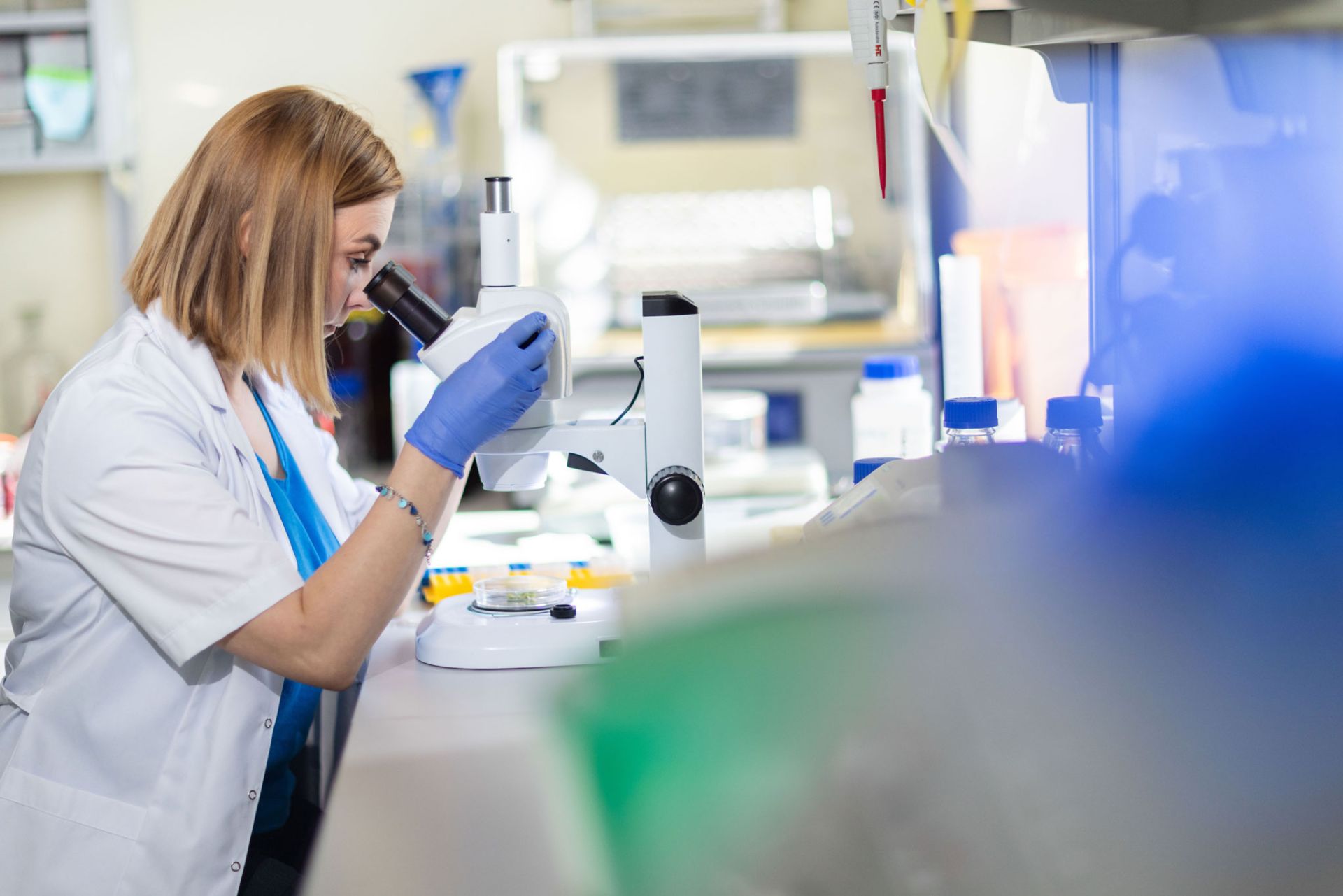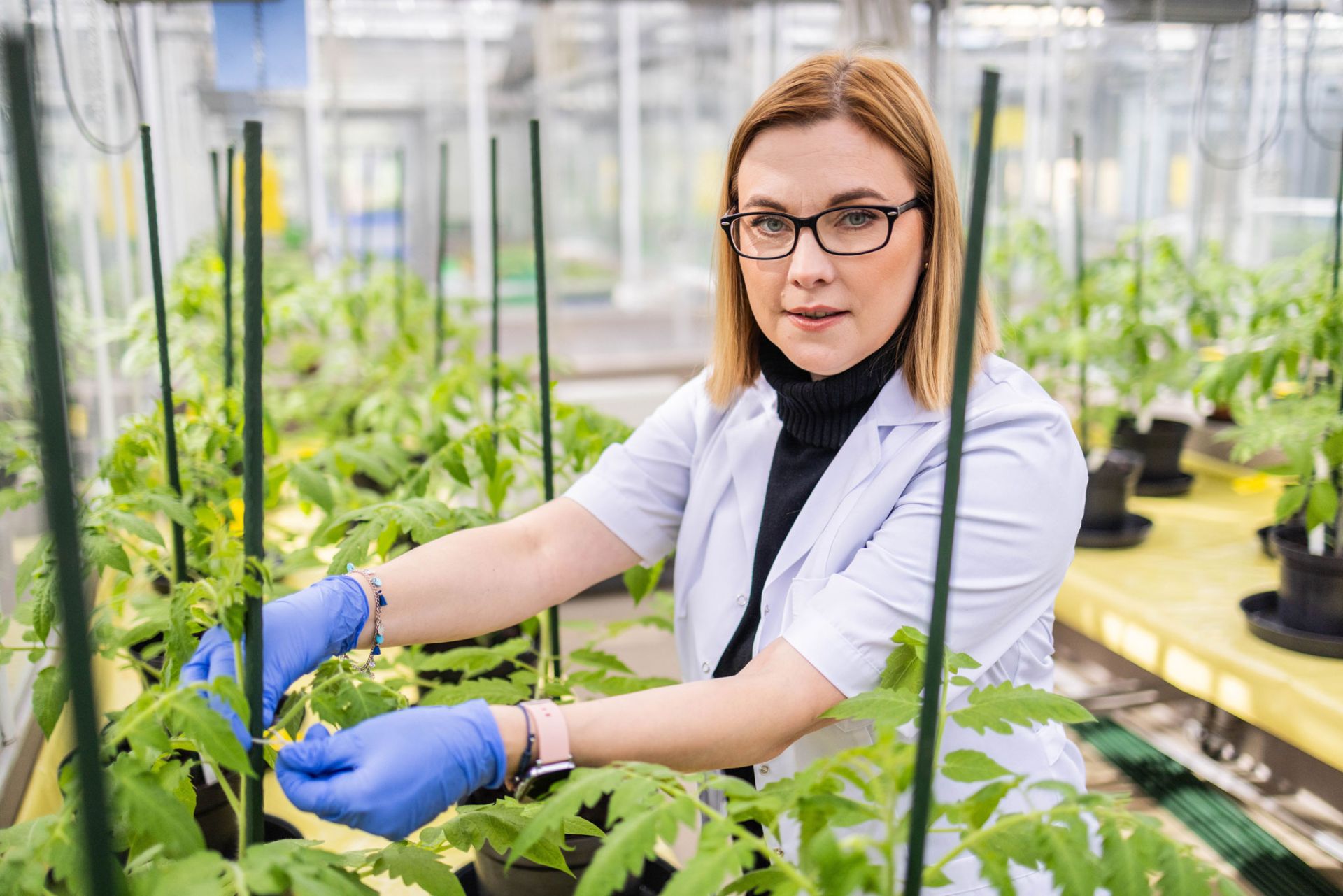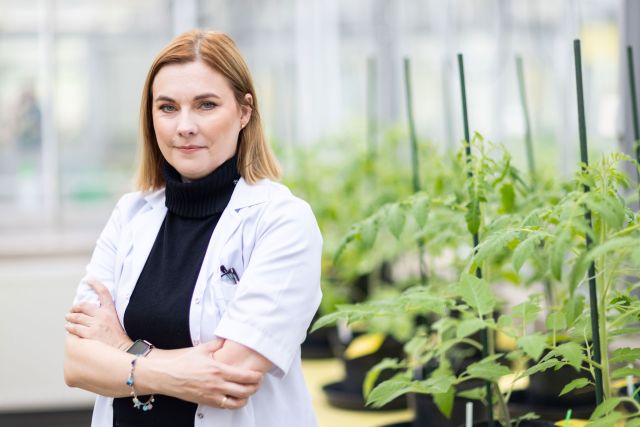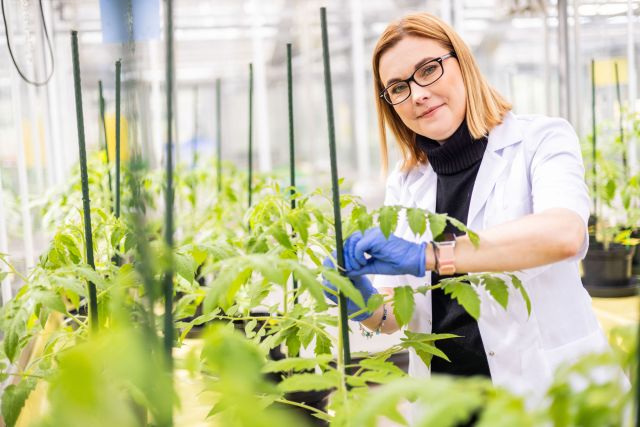Principal Investigator
:
Dr hab. Aleksandra Obrępalska-Stęplowska
Institute of Plant Protection - National Research Institute
Panel: NZ9
Funding scheme
: OPUS 22
announced on
15 September 2021
Plants are basic for life on Earth, providing food and oxygen for people and animals and, like people and animals, they can also get sick if they grow in adverse conditions. During their development, they are exposed to a variety of environmental stressors, including excessively low/high temperatures, drought and various pests, including insects and pathogenic microbes, which can damage plant tissue and cause disease. Most often, several harmful factors may be present in the environment at the same time. Some insects do not just damage plants themselves but also transmit pathogens, such as viruses, which means that plants often need to tackle a double threat.
 Dr hab. Aleksandra Obrępalska-Stęplowska, photo by Michał Łepecki
However, over many years of life on Earth, plants have made important adaptations to the presence of environmental stressors, which allows them to respond to threats and minimise their losses thanks to internal processes and effective, complex defence mechanisms.
Dr hab. Aleksandra Obrępalska-Stęplowska, photo by Michał Łepecki
However, over many years of life on Earth, plants have made important adaptations to the presence of environmental stressors, which allows them to respond to threats and minimise their losses thanks to internal processes and effective, complex defence mechanisms.
Plant function is regulated, among others. by important compounds known as plant hormones (phytohormones), which are crucial for the processes of growth, development, flowering, as well as defence against pests and pathogens. In order to coordinate their response to environmental stressors and their interactions with other elements of the ecosystem, plants need to be able to regulate their phytohormone levels with a very high degree of precision. Small disturbances in the levels of a single phytohormone may cause a cascade of changes in plant physiology.
It is still not completely clear how mutations in plant genes responsible for phytohormone synthesis impact the complex interactions between plants, insects and viruses. The exact role of virus-encoded factors in this context is also not entirely understood. The purpose of our project is to explain how exactly phytohormone synthesis disorders and selected viral gene mutations affect processes within plant cells and how they impact any further interactions between plants and other elements of the ecosystem.
The project takes particular interest in the far-reaching effects of such mutations, and not just their impact on plant sensitivity to viruses and insects, but also on changes in the biology of such insects and their consequences. An increase in insect population or the developmental cycle rate of insect vectors may accelerate the spread of viruses in the environment, which is obviously an undesirable outcome.
 Dr hab. Aleksandra Obrępalska-Stęplowska, photo by Michał Łepecki
The pathosystem used in the project consists of plants, aphids and aphid-transmitted viruses (CMV and PVY). We study plants with reduced phytohormone levels (JA, ET, ABA), resulting from mutations in genes responsible for their synthesis, as well as plants without such mutations, when they are exposed to contact with insects, viruses and virus-transmitting insects. Within such systems, we analyse insect feeding preferences and orientation behaviour, as well as changes in insect population size and virus transmission efficiency. Our goal is to explain why insects behave the way they do on plants with reduced phytohormone synthesis and discover what makes plants more or less “attractive” for them. To this end, we use the methods of reverse genetics, virology, chemistry, entomology, high-throughput and molecular biology techniques. The project will analyse volatile compounds emitted by the plants under study, metabolite content within their cells, and the expression of genes involved in plant defence mechanisms. In addition, we will study the role of selected virus-encoded genes in the pathosystem in order to determine their impact on the orientation behaviour of insects toward infected plants.
Dr hab. Aleksandra Obrępalska-Stęplowska, photo by Michał Łepecki
The pathosystem used in the project consists of plants, aphids and aphid-transmitted viruses (CMV and PVY). We study plants with reduced phytohormone levels (JA, ET, ABA), resulting from mutations in genes responsible for their synthesis, as well as plants without such mutations, when they are exposed to contact with insects, viruses and virus-transmitting insects. Within such systems, we analyse insect feeding preferences and orientation behaviour, as well as changes in insect population size and virus transmission efficiency. Our goal is to explain why insects behave the way they do on plants with reduced phytohormone synthesis and discover what makes plants more or less “attractive” for them. To this end, we use the methods of reverse genetics, virology, chemistry, entomology, high-throughput and molecular biology techniques. The project will analyse volatile compounds emitted by the plants under study, metabolite content within their cells, and the expression of genes involved in plant defence mechanisms. In addition, we will study the role of selected virus-encoded genes in the pathosystem in order to determine their impact on the orientation behaviour of insects toward infected plants.
Our findings on the mechanisms that shape these interactions will likely improve our ability to predict future plant disease epidemics and pest spread, and help develop ways to mitigate the damage.
Project title: Impact of phytohormone levels and virus-encoded factors on the fitness of insect vectors of viruses, virus transmission efficiency, and the three-way interaction between plants, viruses, and insects
Dr hab. Aleksandra Obrępalska-Stęplowska
Dr hab. Aleksandra Obrępalska-Stęplowska graduated in biotechnology from the Adam Mickiewicz University in Poznań, where she later also earned her PhD in Life Sciences, specialising in molecular biology; she went on to work on her habilitation degree in plant agronomy and virology at the Institute of Plant Protection – National Research Institute (IOR-PIB). Her research interests centre on the molecular basis of multilevel interactions between plants, microorganisms (including viruses, pathogenic RNAs and symbiotic bacteria) and their vectors; resistance induction; and pesticide resistance. She has served as a principal investigator or co-investigator in various Polish and international research projects (NCN, NCBiR, Nordic-Baltic Grant, Cost Actions). She is a member of scientific associations such as, e.g., International Society for Molecular Plant-Microbe Interaction (IS-MPMI), Association of Applied Biologists (AAB), and the Polish Phytopathology Society (PTFit), and has authored or co-authored more than 70 scientific publications. She is a member of the Biotechnology Committee, PAS, in its 2020-2023 term, and a professor at the Institute of Plant Protection – National Research Institute. She is also active in science outreach.


